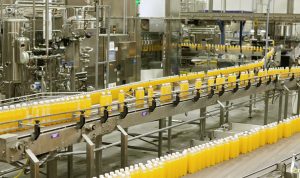24 Sep India and the Food Processing Industries (GS 3, Economics, The Hindu, Indian Express, PIB)
Context: Food processing Industry plays a very important role in the making of GDP. It can boost the aggregate demand of the economy along with increasing the income of the farmers and their well being. It can improve our forex earning if exported, utilize the surplus in agriculture production, provide food security and reduce food wastage. Food processing Sector if flourished well, has plenty of opportunities especially for the rural population in forward and backward linkages of agriculture.
The Food Processing Industry has always been important as it provides linkages and synergies among all the sectors of the economy viz. Primary i.e. agriculture, Secondary i.e. industry and Tertiary i.e. transportation of goods, R & D in agro-processing etc.
A robust Food Processing Industry provides opportunities to increase the farmer’s income, to utilise excess agriculture production and also important for reducing food wastage as it increases shelf life along with enhancing the quality. The Indian food processing industry promises high economic growth and makes good Profits.
The Food-Processing Industry has become an integral part of the food supply chain in the global economy, and India has also seen growth in this sector in the last few years. According to the Ministry of Food Processing Industries the contribution of agricultural and processed products in India’s total exports is 11%. The Indian government has been encouraging and incentivizing agricultural exports to meet an ambitious target of $60bn by 2022.
Primary processed agricultural commodities form the majority share. India’s export earnings will increase by focusing more on value-added processed food products rather than primary processed agricultural commodities.
India has the potential – The value of agricultural and processed food increased significantly from $17.8bn to $20.65bn during the period of 2015-16 to 2019-20.
We are witnessing a shift in the Indian agricultural economy from Primary to Secondary agriculture where the focus is more on developing various processed foods.
India’s agricultural export basket is shifting from traditional commodities to nontraditional processed foods. For example along with basmati rice which is the top export commodities the unusual spike of non basmati rice is also being seen. Similarly, Indian buffalo meat is seeing a increasing demand in international markets due to its lean character and near organic nature. The export potential of buffalo meat is huge and very promising, especially in countries like Vietnam, Hong Kong and Indonesia.
Agriculture Export Policy: The Government introduced a comprehensive Agriculture Export Policy in December 2018, with the following objectives:
-
To diversify our export basket, destinations and boost high value and value added agricultural exports, including focus on perishables.
-
To promote novel, indigenous, organic, ethnic, traditional and non-traditional Agri products exports.
-
To provide an institutional mechanism for pursuing market access, tackling barriers and dealing with sanitary and phytosanitary issues.
-
To strive to double India’s share in world agri exports by integrating with global value chains.
-
Enable farmers to get benefit of export opportunities in overseas market.
Issues and Concerns:
-
In 2020-21, the export of cashew kernels, groundnuts, guar gum, cocoa, poultry, sheep and goat meat went down in terms of value and total quantity. The export of processed food products has not been growing fast enough because India lacks comparative advantage of price and quality in many items. The domestic prices of processed food products are much higher compared to the international market prices.
-
The exporters of processed food confront difficulties due to Non-Tariff measures imposed by other countries on Indian exports. For example Sanitary and phyto sanitary (SPS) measures, an agreement under WTO which allows member countries to frame rules and regulations regarding their import of food items so as not to affect the health of human beings, plants and animals of the importing country.
-
The other difficulties include mandatory pre-shipment examination by the Export Inspection Agency which is generally lengthy and costly.
-
Compulsory spice board certification is needed even for ready-to-eat products which contain spices in small quantities.
-
Most of the State governments are lacking in strategic planning of exports.
-
Agricultural Policy is not predictable and consistent which discourages the investments by the private sector.
-
Most of the developed countries are not importing meat and dairy based products from us considering their health issues.
-
Recently the U.S. has withdrawn the Generalised System of Preference for import of processed food from India.
-
Export shipments to the U.S. require an additional health certificate.
-
There is an absence of an equivalency agreement with developed countries regarding organic produce.
The way forward: The Government’s policy should be in regard to nurturing food processing companies, ensuring cost-effective (low cost) production, ensuring food quality of global standards as developed countries have fixed higher standards for import of food items, creating a supportive environment to promote export of processed food.
Indian brands with some reputation should be encouraged to export processed foods globally as they can comply with the global standard of codex. (Codex Alimentarius Commission (Codex) is one of the three 3 standards organizations of WTO who set standards that WTO members should base their SPS methodologies on. The other two are the World Organization for Animal Health (OIE) and the Secretariat of the International Plant Protection Convention (IPPC).
Indian companies have to focus on global food quality standards, cost competitiveness, technologies, and tap the global market of food processing.
India has the potential to become a global leader in the food processing Industry as it has the competitive advantages in various agricultural commodities which can be passed to food processing.
Md Layeeque Azam, Economics Faculty
24nd september 2021 current Affairs Download
Plutus IAS Current Affair Team Member




No Comments